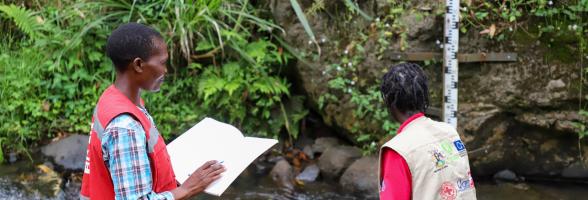CONTEXT:
Uganda faces numerous natural and human-made hazards, including floods, droughts, conflicts, and epidemics, leading to a significant risk profile. The INFORM Risk 2024 assessment ranks Uganda as the 12th highest globally for risk, with a score of 7.0/10. Hazard exposure is particularly acute in regions like Mt. Elgon, where recent floods, landslides, and other disasters have directly affected over 1,830 households across districts like Mbale, Sironko, and Bulambuli.
The occurrence of hazards combined with limited capacity and high vulnerability across communities in the Mt. Elgon region has resulted in severe devastation through destruction of assets, loss of livelihoods and food insecurity impacts. Despite being first responders on the ground, local humanitarian actors repeatedly report lack of access to resources and decision-making power needed to respond effectively. The identified needs in Uganda reveal a comprehensive set of challenges stemming from a wide range of natural and man-made hazards.
In response, Uganda developed the National Policy for Disaster Preparedness and Management (NPDPM) in 2011, which outlines a structured framework for disaster management through various committees, including District Disaster Management Committees (DDMCs) at different government levels.
As part of DRM policy implementation to address these challenges, Oxfam in Consortium with Uganda Red Cross Society and Caritas Tororo with funding from European Union Humanitarian Aid (ECHO) develop a project aiming to enhance the capacity of local Disaster Risk Management (DRM) actors and improve coordination mechanisms at various levels. The action specifically is aimed to address the limitations in knowledge, capacities and skills on DRM focusing on strengthening local DRM actors' abilities to anticipate, prepare, and respond to multi-hazard shocks in urban, semi-urban, and rural areas and ensure a timely and effective response to sudden onset emergencies or triggers of slow-onset emergencies.
Overall, the combined effects of Uganda's vulnerability to hazards, limited capacity for disaster management, and weak coordination among stakeholders have led to severe consequences, including asset destruction, loss of livelihoods, and heightened food insecurity. To improve responses, it's essential to empower local humanitarian actors, enhance their resource access, and ensure that disaster response training is provided to local first responders, enabling timely and effective emergency action. The proposed activities are aligned with the identified needs, addressing gaps in disaster preparedness, coordination mechanisms, and the inclusion of marginalized groups, such as women and children.
ABOUT THE PROJECT
With funding from the European Commission Humanitarian Aid (ECHO), Oxfam in consortium with Caritas Tororo and Uganda Redcross Society (URCS) are implementing the Early Warning Early Action, Strengthening Multi-Hazard Disaster Preparedness in Mt Elgon Subregion project.
The 2 year project which is being implemented across seven districts in the Mt Elgon Region will enhance community resilience to shocks and stresses through effective and participatory multi-hazard anticipation actions and preparedness measures and will build upon the work done under the previous ECHO DP- Strengthening Community-led Actions on Disaster Preparedness and Response
PROJECT OBJECTIVE/ GOAL:
- To enhance community resilience to shocks and stresses in Mt. Elgon sub-region through effective and participatory multi-hazard anticipatory action and Preparedness measures.
EXPECT RESULTS:
- Local DRM actors (including local government, private sector and communities) effectively anticipate, prepare and respond to multi-hazard shocks in urban, semi-urban and rural areas.
- Local and national actors lead a timely and effective response to sudden onset emergencies or triggers of slow-onset emergencies in a safe, accessible and participatory manner through access to a crisis modifier.
TARGET REACH:
- 120, 283
TOTAL BUDGET
- 1.500,000 Euros
IMPLEMENTING PARTNERS:
- Caritas Tororo
- Uganda Red Cross Society (URCS)
DURATION
- 2 Years (24 Months) – 2024-2026
FUNDED BY
- European Commission Humanitarian Aid (ECHO)
KEY STAKEHOLDERS:
- Existing community structures
- District Disaster Management Committees (DDMCs)
- City Disaster Management Committees (CDMC)
- Sub County Disaster Management Committees (SCDMCs)/
- Village Disaster Management Committees (VDMC)
- Village Savings and Loans Association groups
- The Office of the Prime Minister (OPM) and local Leaders
- Consortium partners and other development partners
GEOGRAPHICAL COVERAGE
- Mt Elgon Region districts of (Bududa, Namisindwa, Sironko, Butaleja, Mbale City, Mbale, and Bulambuli)
